LG Optimus 2X & NVIDIA Tegra 2 Review: The First Dual-Core Smartphone
by Brian Klug & Anand Lal Shimpi on February 7, 2011 3:53 AM EST- Posted in
- Smartphones
- Tegra 2
- LG
- Optimus 2X
- Mobile
- NVIDIA
Battery Life
There’s been a lot of speculation about whether dual-core phones would be battery hogs or not. Turns out that voltage scaling does win, and P=V^2/R does indeed apply here. The 2X delivers middle of the road 3G and WiFi web browsing battery life numbers, and above average 3G talk time numbers.
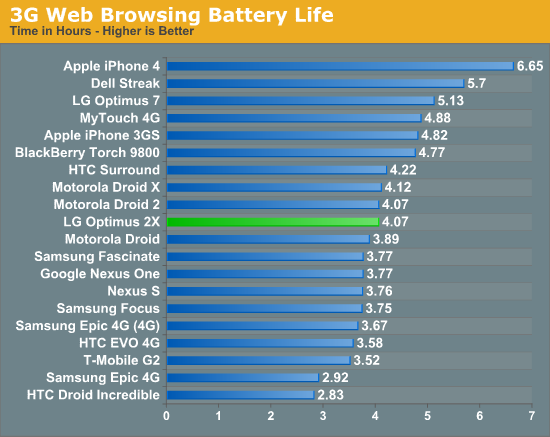
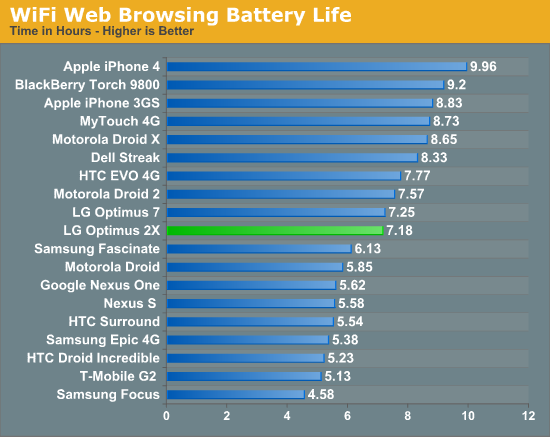
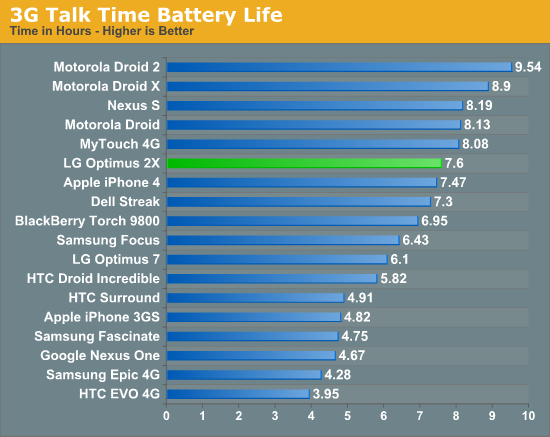
We’ve also got another new test. Gaming battery life under constant load is a use scenario we haven’t really been able to measure in the past, but are now able to. Our BaseMark GUI benchmark includes a battery test which runs the composition feature test endlessly, simultaneously taxing the CPU and GPU. It’s an aggressive test that nearly emulates constant 3D gaming. For this test we leave WiFi and cellular interfaces enabled, bluetooth off, and display brightness at 50%.
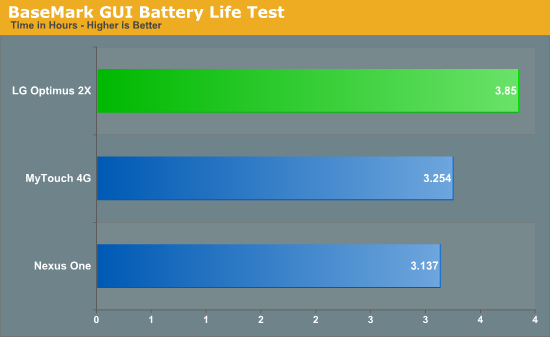
I’m a bit disappointed we don’t have more numbers to compare to, but the 2X does come out on top in this category. Anand and I both tested the Galaxy S devices we have kicking around (an Epic 4G and Fascinate), but both continually locked up, crashed, or displayed graphical corruption while running the test. Our constant 3D gaming test looks like a winner for sifting out platform instability.
Conclusion
The 2X is somewhat of a dichotomy. On one side, you've got moderately aesthetically pleasing hardware, class-leading performance from Tegra 2 that doesn't sacrifice battery life at the stake, and a bunch of notable and useful extras like HDMI mirroring. On the other, you've got some serious experience-killing instability issues (which need to be fixed by launch), a relatively mundane baseband launching at a time when we're on the cusp of 4G, and perhaps most notably a host of even better-specced Tegra 2 based smartphones with more RAM, better screens, and 4G slated to arrive very soon.
It's really frustrating for me to have to make all those qualifications before talking about how much I like the 2X, because the 2X is without a doubt the best Android phone I've used to date. Android is finally fast enough that for a lot of the tasks I care about (especially web browsing) it's appreciably faster than the iPhone 4. At the same time, battery doesn't take a gigantic hit, and the IPS display is awesome. The software instability issues (which are admittedly pre-launch bugs) are the only thing holding me back from using it 24/7. How the 2X fares when Gingerbread gets ported to it will also make a huge difference, one we're going to cover when that time comes.
The other part of the story is Tegra 2.
Google clearly chose NVIDIA’s Tegra 2 as the Honeycomb platform of choice for a reason. It is a well executed piece of hardware that beat both Qualcomm and TI’s dual-core solutions to market. The original Tegra was severely underpowered in the CPU department, which NVIDIA promptly fixed with Tegra 2. The pair of Cortex A9s in the AP20H make it the fastest general purpose SoC in an Android phone today.
NVIDIA’s GeForce ULV performance also looks pretty good. In GLBenchmark 2.0 NVIDIA manages to hold a 20% performance advantage over the PowerVR SGX 540, our previous king of the hill.
Power efficiency also appears to be competitive both in our GPU and general use battery life tests. Our initial concern about Tegra 2 battery life was unnecessary.
It’s the rest of the Tegra 2 SoC that we’re not completely sure about. Video encode quality on the LG Optimus 2X isn’t very good, and despite NVIDIA’s beefy ISP we’re only able to capture stills at 6 fps with the camera is set to a 2MP resolution. NVIDIA tells us that the Tegra 2 SoC is fully capable of a faster capture rate for stills and that LG simply chose 2MP as its burst mode resolution. For comparison, other phones with burst modes capture at either 1 MP or VGA. That said, unfortunately for NVIDIA, a significant technological advantage is almost meaningless if no one takes advantage of it. It'll be interesting to see if the other Tegra 2 phones coming will enable full resolution burst capture.
Then there’s the forthcoming competition. TI’s OMAP 4 will add the missing MPE to the Cortex A9s and feed them via a wider memory bus. Qualcomm’s QSD8660 will retain its NEON performance advantages and perhaps make up for its architectural deficits with a higher clock speed, at least initially. Let’s not forget that the QSD8660 will bring a new GPU core to the table as well (Adreno 220).
Tegra 2 is a great first step for NVIDIA, however the competition is not only experienced but also well equipped. It will be months before we can truly crown an overall winner, and then another year before we get to do this all over again with Qualcomm’s MSM8960 and TI's OMAP 5. How well NVIDIA executes Tegra 3 and 4 will determine how strong of a competitor it will be in the SoC space.
Between the performance we’re seeing and the design wins (both announced and rumored) NVIDIA is off to a great start. I will say that I’m pleasantly surprised.


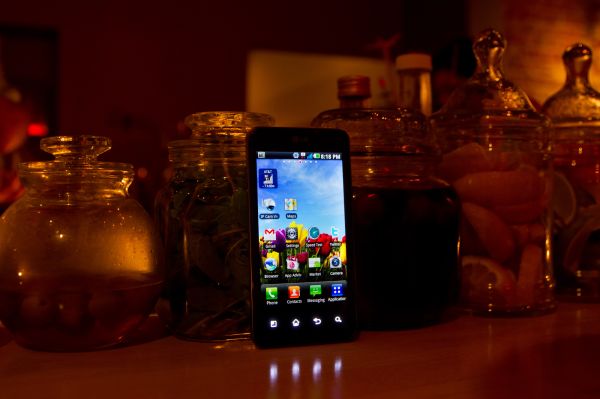








75 Comments
View All Comments
matt b - Tuesday, February 8, 2011 - link
Just curious because I've heard rumors that HP will use the Qualcomm chipset and I've also heard rumors that they will stick with Ti for their new tablets/phones. I just wondered if you know for sure since I know that you met with folks at CES. I hope that we all find out tomorrow at the HP event.Great review.
TareX - Wednesday, February 9, 2011 - link
I'd like to see Tegra 2 on the Xoom compared to Tegra 2 on the Optimus 2X.Why? Well, simply put, the only Android version that seems to be optimized for dual-core is Honeycomb.
Dark Legion - Wednesday, February 9, 2011 - link
Why is there no Incredible on 2.2? I could understand if you had both 2.1 and 2.2, like the Evo, but as it is now does not show the full/current performance.Morke - Thursday, February 10, 2011 - link
"It’s a strange dichotomy that LG sets up with this launcher scheme that divides “downloaded” apps from “system applications,” one that’s made on no other Android device I’ve ever seen but the Optimus One. The end result is that most of the stuff I want (you know, since I just installed it) is at the very last page or very bottom of the list, resulting in guaranteed scrolling every single time. If you’re a power user, just replace the launcher with something else entirely."You are not right there.
First you can create additonal categories (aside from system applications and downloads) and move applications between them.
Secondly you can rearrange the ordering of the applications inside a category (allowing you to have those on top which you access most frequently). You can also delete applications right away in this edit mode.
There is a youtube video demonstrating this:
http://www.youtube.com/watch?v=Dvvtl6pSNp8
See time index starting with 4:21.
Maybe you should correct your review on this?
Morke - Thursday, February 10, 2011 - link
The correct youtube URL demonstrating application launcher management is actuallyhttp://www.youtube.com/watch?v=lDo-1-jwLko&fea...
brj_texas - Thursday, February 10, 2011 - link
Anand,A question on the statement in the benchmarking section, "the SunSpider benchmark isn't explicitly multithreaded, although some of the tests within the benchmark will take advantage of more than one core. "
My understanding was that all of the tests within sunspider are single-threaded, but a dual-core processor can run the javascript engine (and the sunspider tests) in a separate thread from the main browser thread when you call sunspider from a browser window.
Can you clarify which tests support multi-threading in sunspider if that is in fact what you meant?
On the topic of multi-threading, we've used moonbat, a multi-core variant of sunspider, to explicitly test multi-core performance with javascript code. I wonder if you have any other benchmarks under investigation that measure multi-core performance?
Thanks
-Brian
worldbfree4me - Saturday, February 12, 2011 - link
Thanks for another thorough and in-depth analysis. But I have a question to ask,Should we upgrade (break our 2 year contract agreement for this phone) or ride out our contract?
We trust and value your our opinion. Tom’s hardware does a GPU hierarchy chart every few months, can you do a phone hierarchy in the future?
lashton - Sunday, February 13, 2011 - link
They have a really good idea and lead the market but it falls short because its not quite righttnepres - Tuesday, April 5, 2011 - link
I now own a optimus 2x. The first was dead on arrival, but this one is perfect. The LG software is innovative and pleasing to the eye. In various places they made real improvements to the UI that are just brilliant,ie. the ability to sort and categorize apps. At times the UI is not as fast as you would expect, especially when adding apps/widgets to one of the 7 pages. It seems LG generates a list of widgets for you, so you can see what apps support this mode, and that takes about a second. As I recall, on HTC devices you are just presented with a list of apps and u have to try and see if you can widget it.The LG keybord has a brilliant feature, you tab the side of the phone to move the cursor. Sadly in other respects the keyboard is lacking, ie. when you long-pres you do not get the alternates you might wish, such as numbers.
The batterytime is superb, using the UI consumes much less power than on my desire.
Copy/paste in the browser does not activate via long-pres, you have to hit menu button, but on the plus side its easier to use than what HTC made.
During 2 days of very intensive use i have had 1 app (partially) crash and that was the marketplace. No other issues so far, its my verdict that the unstability issues are overrated.
No problems with wifi using stock ISP (TDC) supplied router. (sagemcom)
To engadget: How on earth (!!?!!?) can you state there is no use for dualcore. When browsing one loads flash the other the rest. Its so fast you cant believe it. Try loading www.ufc.com on a non dualcore phone and you get my drift.
I do not hesitate to give the optimus 2x my warm recommendations.
VERDICT: 9/10 (missing 4g)
Sannat - Thursday, May 12, 2011 - link
gsmarena sound benchmark for optimus 2x isnt great...could it be a s/w issue...??